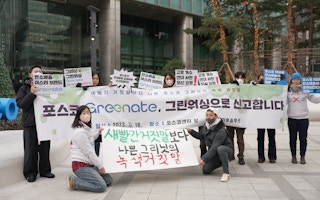Two of South Korea’s largest corporate emitters, manufacturing and services conglomerate SK and steelmaker Posco, have been hit with a legal complaint for using a premium on clean electricity to falsely claim emissions reductions.
The complaint was filed with Korea’s Fair Trade Commission and the Korea Environmental Industry and Technology Institute on Friday by Seoul-based climate advocacy group Solutions For Our Climate (SFOC).
SFOC said the industry giants have been greenwashing their decarbonisation efforts by double-counting the emissions reductions they have made through the “green premium” system, which is an additional fee companies pay state-owned utility Korea Electric Power Corporation (KEPCO) to procure renewable energy.
Clean electricity bought through the green premium comes from large power companies which are obliged under Korean law to generate or purchase a certain share of renewable energy. Korea Energy Agency, the country’s energy board, certifies the amount of emissions reduced from renewables for the power producers, which is then excluded from their emissions portfolio. Companies that claim emissions cuts based on the green premium are therefore double-counting the amount of avoided climate pollution, argued SFOC.
For instance, semiconductor technology company SK Siltron claims to have reduced 7.7 million tonnes of carbon dioxide equivalent (tCO2e) by purchasing 168 gigawatt-hours of green premium in 2022, but these emissions reductions claims should not be claimed as part of the company’s decarbonisation plans, SFOC said.
Korea’s Ministry of Environment and Ministry of Trade, Industry and Energy has outlawed companies that purchase a green premium from claiming emissions reductions, because doing so would skew calculations for tracking Korea’s progress towards meeting its national 2050 net zero target, which was enshrined in law in 2021.
SK and Posco have yet to respond to the complaint.
SK, which owns 175 businesses in energy, life sciences, advanced materials, mobility, and semiconductors, has pledged to be net zero by 2050 by investing in renewables and carbon capture, use and storage technologies. It aims to reduce carbon emissions by 200 million tonnes by 2030, which the company claims is equivalent to 1 per cent of global carbon reduction targets.
Posco, one of the world’s largest steel companies, has also committed to be net zero by mid-century in line with Korea’s national net zero target. It aims to reduce its emissions in phases: 10 per cent by 2030, 50 per cent by 2040, and net zero by 2050. Its reported Scope 1 and Scope 2 emissions have fallen from of 78.5 million tCO2e in 2021 to 70.2 million tCO2e in 2022.
SFOC said that a problem with the green premium is that there are “no clear links” between the funds raised from the premium and the expansion of renewable energy, and there is a lack of transparency over how Korea Energy Agency is using the funds to slash emissions.
Some 87 per cent of the renewable energy claims made by companies that have signed up to RE100, a group of company’s committed to using only renewables, come via the green premium system in Korea.
Erroneous emissions reduction claims made by SK and Posco could affect the reputations of multinational firms they supply semiconductors and steel to, which include Apple and Tesla, SFOC said.
“While there are other options under K-RE100, such as direct Power Purchase Agreements (PPA), that contribute more significantly to the energy transition, green premium remains the cheapest and most convenient choice for many RE100 companies,” noted Geonyoung Kim, a lawyer at Solutions for Our Climate. “The South Korean government must create policies to incentivise and support companies to choose renewables procurement options with additionality.”
SK’s energy arm SK E&S was taken to court by SFOC in 2021 over an advertising campaign that claimed the company produced “carbon-free” natural gas. It was the first legal action taken against a company for greenwashing in Korea.
The latest complaint comes a year after Korea became the first Asia jurisdiction to enact a law against greenwashing, with firms to be fined up to KRW3 million (US$2,300) for companies that mislead the public about their environmental impact.
Other jurisdictions in Asia have also started to put pressure on firms over exaggerated green claims. Over the last 12 months, Singapore and Australia have banned advertisements for greenwashing for the first time.

















